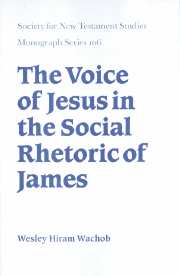Book contents
- Frontmatter
- Contents
- Acknowledgments
- Sources and abbreviations
- 1 Introduction
- 2 The history of research and the present investigation
- 3 The inner texture of James 2.1–13
- 4 The intertexture of James 2.1–13
- 5 The social and cultural texture of James 2.1–13
- 6 Conclusion
- Bibliography
- Index of sources and authors
- Index of biblical references
- Index of subjects
6 - Conclusion
Published online by Cambridge University Press: 22 September 2009
- Frontmatter
- Contents
- Acknowledgments
- Sources and abbreviations
- 1 Introduction
- 2 The history of research and the present investigation
- 3 The inner texture of James 2.1–13
- 4 The intertexture of James 2.1–13
- 5 The social and cultural texture of James 2.1–13
- 6 Conclusion
- Bibliography
- Index of sources and authors
- Index of biblical references
- Index of subjects
Summary
Before I summarize the course of our investigation and suggest something of its possible contribution to New Testament studies, I should like to ask very briefly some general questions about the ideological implications of the rhetoric in James, particularly with reference to James 2.5. By “the ideological implications of the rhetoric,” I mean how the “ideology” of the Epistle of James functions as the social use of language that it is; namely, a written instance of deliberative discourse emanating from the first century of the Mediterranean world. And, here, the operative definition of ideology is a “neutral” one, the one employed by John H. Elliott (1981), in A Home for the Homeless: A Sociological Exegesis of 1 Peter, Its Situation and Strategy. Accordingly, ideology is “ ‘an integrated system of beliefs, assumptions and values, not necessarily true or false, which reflects the needs and interests of a group or class at a particular time in history’ ” (p. 268; quoting D. B. Davis, 1975, p. 14). And I presume (following Elliott) that the ideological character of James is such that there is within it “an interrelation and inseparability of social and religious frames of reference, meaning and function” (p. 268).
We have discussed some of the ways in which the rhetoric of James 2.1–13 exploits the “beliefs, assumptions and values” of the author, the audience, and the broader culture in an effort to persuade the audience that acts of partiality are incompatible with Jesus' faith.
- Type
- Chapter
- Information
- The Voice of Jesus in the Social Rhetoric of James , pp. 194 - 201Publisher: Cambridge University PressPrint publication year: 2000



